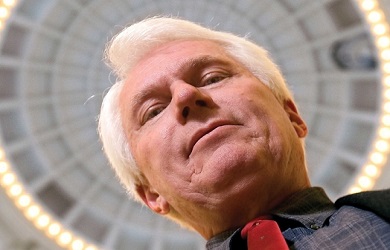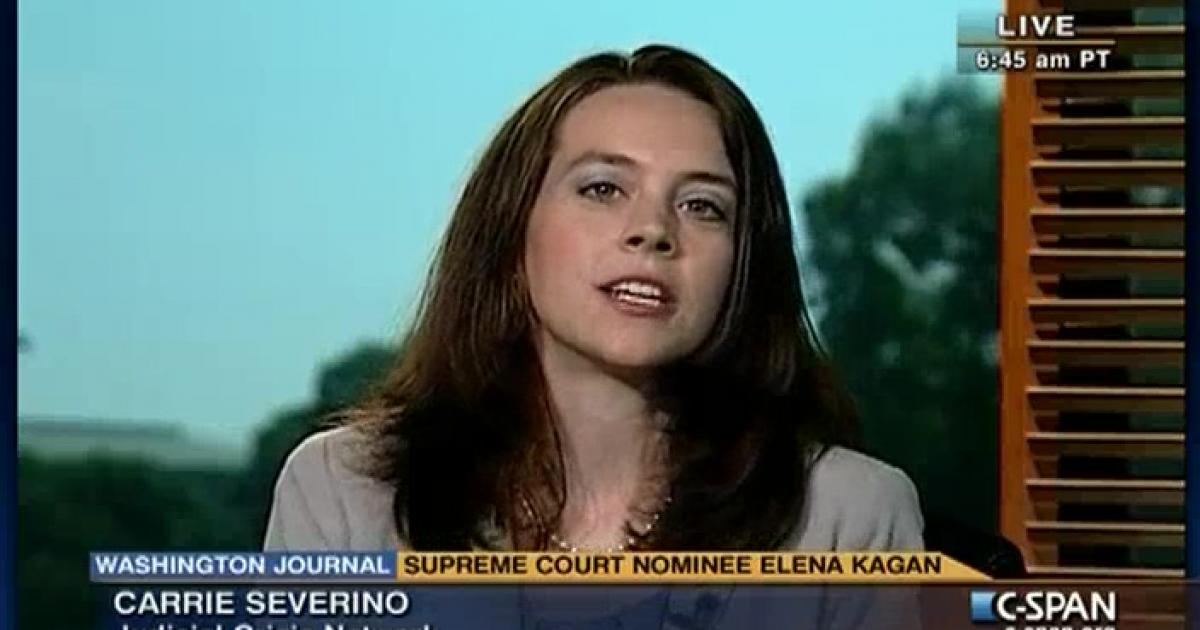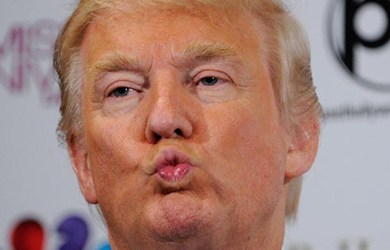It seems that, after years of operating behind the scenes and under the radar, Manuel Miranda has returned to once again take a lead role in the judicial confirmation wars.
Just in the last few days, Miranda has burst back onto the scene, drafting a letter calling on Senate Republicans to filibuster Sonia Sotomayor’s nomination, suggesting that Senator Mitch McConnell should resign if he can’t wage a better fight to stop her and, just for good measure, saying that, unlike Blacks, Hispanics “think like everybody else,” whatever that is supposed to mean.
As such, Miranda is now getting a lot of attention, especially regarding the history of how he was ousted from his position as a one-time aide to Sens. Orrin Hatch and Bill Frist only to re-emerge as a one-man judicial confirmation army.
So now seems like a good time to dust off a report I wrote several years ago shortly after the results of the investigation by the Sergeant at Arms of the U.S. Senate was released, which chronicled Miranda’s role in accessing internal Democratic memos regarding the issue of judicial nominations while he was working for Senators Hatch and Frist.
It was this behavior that caused Miranda to lose his job, though he has steadfastly denied any wrong-doing, consistently insisting that he was, in fact, a beacon of morality and ethics as he worked to expose Democratic “collusion” with outside interest groups.
Though the Senate report, known as the “Pickle Report” after Sergeant at Arms William Pickle, suggested that Miranda could have faced various charges for his behavior, he was never charged with any crime.
As I suspect that most people barely even remember the “Memogate” controversy from 2003-2004 and aren’t going to wade through the Pickle Report’s 40 pages to figure out what went on, I’ve decided to post the report [PDF] I wrote at the time and excerpt this section covering the Pickle Report’s findings on Miranda’s activities:
The Pickle Report
While right-wing pundits and activists were busy defending Miranda and disparaging the investigation before knowing all the facts, Sergeant-at-Arms Pickle plowed ahead. Over the course of three months, Pickle and his staff interviewed over 160 individuals and conducted detailed “forensics analysis of the Judiciary Committee servers, available backup tapes, and the desktops of relevant staff members.” In March, Pickle finally completed his investigation and presented his report to members of the Senate Judiciary Committee. Thanks to this report, we now know how the documents were obtained and who was responsible. We also know that nearly everything right-wing pundits said about the theft of the documents and the subsequent investigation was totally wrong.
As the report explains, in the fall of 2001 a Judiciary Committee Nomination Unit clerk, Jason Lundell, had learned how to access documents contained on Democratic computers by watching the System Administrator do some work on his computer and then duplicating the Administrator’s key strokes once he was alone. By doing so, he was able to gain access to the entire network and read, modify or delete Democratic documents because the newly hired and inexperienced system administrator had failed to restrict access to appropriate users.
Initially, Lundell downloaded between 100-200 pages of Democratic documents having to do with the nomination of Judge Charles Pickering and turned them over to two of his supervisors. Almost immediately both supervisors concluded that possessing such documents was improper and destroyed them and ordered Lundell to do the same and delete any files on his computer.
A short time later, Miranda joined the Committee staff as a counsel for the Nominations Unit. Not long after Miranda came on board, Lundell showed Miranda how to access the Democratic files but explained that he had been ordered not to use them. According to the Pickle Report, Miranda told Lundell not to listen to his supervisors and that there was nothing wrong or illegal about accessing Democratic files. Thus Miranda not only became the recipient of the Democratic documents, but a key figure in obtaining them, guiding Lundell about what information to look for and where to look.
From the fall of 2001 until January 2003, when Miranda left the Judiciary Committee to work for Senator Frist, he and Lundell downloaded several thousand internal Democratic documents and possibly shared them with other Republican staffers and the media. Miranda repeatedly requested files from Lundell even after he began working for Frist and thus no longer had access to the Judiciary Committee’s server. At one point Miranda even asked Lundell to “undertake a discreet mission” to gather documents and provide them to Sean Rushton, Executive Director of the Committee for Justice, so that he could build up a relationship with the press. Lundell replied that he would be “happy to assist in this covert action” and subsequently e-mailed Rushton 169 documents. Lundell and others speculated that Miranda himself also turned over documents to Rushton and others but Miranda denies this and it is impossible to know the truth as the Wall Street Journal, the Washington Times, the Committee for Justice and the Coalition for a Fair Judiciary all refused to cooperate with Mr. Pickle’s investigation. Despite this lack of cooperation, the Pickle Report does note that when the files showed up on the Coalition for a Fair Judiciary’s website, one of the documents contained a directory path that forensic review determined came from “an e-mail from a web page that was viewed and printed by Mr. Miranda with Internet Explorer.”
As for Miranda’s allegations that Democratic staffers on the committee were made aware that their documents were vulnerable, this too is contradicted by the report. Common sense dictates, and the report notes, that “[t]he Democratic staff working on judicial nominations clearly did not know there was a vulnerability. If they had, presumably they would have protected their files.” But beyond this, the allegation that the Democrats had been made aware of the problem seems to have come solely from Miranda himself. Miranda claims to have heard from Lundell that another staffer named Ryan Davis had informed the system administrator of the vulnerability. But Lundell denied ever telling Miranda this and Davis claimed that he did not recall ever having such a conversation with the administrator.
Furthermore, during the investigation, Miranda claimed to have kept printed versions of the documents that he considered the most valuable in a folder, which he asserted he had lost during his move to Frist’s office. It was not until his final interview with investigators that Miranda got around to informing them that a friend had made a “backup disk” for him of relevant Democratic documents. But Miranda refused to provide the friend’s name to investigators out of a stated desire not to prolong the investigation. As the Pickle Report concluded, the existence of the backup disk coupled with the claim that he “lost” his file containing Democratic documents “leaves open the possibility” that Miranda still “has Democratic documents in his possession.”
The Pickle Report concluded by outlining the “criteria for possible referrals for disciplinary action and for criminal prosecution to the Department of Justice,” noting that Miranda and others could potentially face prosecution for ethical violations, professional misconduct, violation of the Computer Fraud and Abuse Act, lying to investigators and violating various criminal statutes.
Of course, Miranda disputed many of the report’s findings at the time and will no doubt continue to do so even today.
Nonetheless, the report, written in 2004, covers not only Miranda’s dealings while working on the Hill, but his ties to the various right-wing media outlets and judicial groups who sought to use the ill-gotten internal Democratic memos for partisan purposes, and explains just how Miranda went from being an obscure Senate aide to the right-wing folk hero and leading crusader in the judicial confirmation wars we know today.








